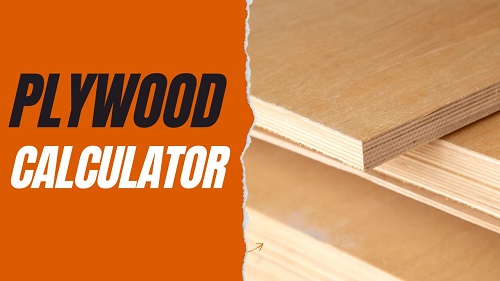When you’re working on a project that involves plywood, one of the most important things to consider is the weight of the material.
You need to know how much your plywood sheets will weigh so you can plan accordingly for transportation, storage, and installation.
But calculating the weight of 4×8 plywood can be a challenge, especially if you’re not familiar with the different types and densities of plywood. That’s where our 4×8 plywood weight calculator comes in – a simple tool designed to help you get an accurate estimate of your plywood weight in no time.
What is 4×8 Plywood?
Plywood Weight Calculator
A standard sheet of plywood, 4×8 plywood is a versatile and widely used building material in construction, furniture making, and DIY projects. It is made from layers of wood veneer pressed together to form a strong and durable panel.
Dimensions and Specifications
At its core, 4×8 plywood measures 4 feet wide and 8 feet long, with a thickness that varies depending on the type and grade of plywood. The standard thickness ranges from 1/8 inch to 1 inch.
Types of 4×8 Plywood
Available in various types, 4×8 plywood caters to different needs and applications. You can choose from:
- Softwood plywood (e.g., pine, spruce)
- Hardwood plywood (e.g., oak, maple)
- Exterior-grade plywood
- Interior-grade plywood
- Specialty plywood (e.g., marine, aircraft)
Any project you undertake will benefit from selecting the right type of 4×8 plywood.
| Type | Description |
| Softwood | Suitable for general construction and furniture making |
| Hardwood | Ideal for high-end furniture and decorative projects |
| Exterior-grade | Designed for outdoor use, resistant to moisture and weathering |
| Specialty | Meets specific requirements for unique applications (e.g., marine, aircraft) |
Even with the various types of 4×8 plywood available, it’s important to consider factors like budget, durability, and aesthetics when making your selection. You can choose from:
- CDX plywood for general construction
- Baltic birch plywood for furniture making
- Pressure-treated plywood for outdoor use
- Any other type that suits your project’s specific needs
| Type | Description |
| CDX | Economical, suitable for general construction |
| Baltic birch | High-quality, ideal for furniture making |
| Pressure-treated | Resistant to rot and insect damage, suitable for outdoor use |
| Other | Specialized types for unique applications |
Factors Affecting 4×8 Plywood Weight Calculator
If you’re trying to calculate the weight of 4×8 plywood, there are several factors to consider. These include:
- Density of wood
- Moisture content
- Type of plywood
- Adhesives and additives
Assume that even small variations in these factors can significantly impact the overall weight of your plywood.
Density of Wood
Heft of the wood is largely determined by its density, which varies depending on the species of tree used to make the plywood. Different types of wood have unique densities, affecting the final weight of your 4×8 plywood.
Moisture Content
Among the factors influencing plywood weight, moisture content plays a significant role. Wood naturally contains some level of moisture, and this can impact its overall weight.
Affecting the weight of your plywood, moisture content can range from 4% to 20%. For instance, if your plywood has a higher moisture content, it will be heavier due to the added water weight.
Conversely, plywood with lower moisture content will be lighter. Understanding the moisture content of your plywood is crucial for accurate weight calculations.
Calculating 4×8 Plywood Weight
All you need to know is the density of the plywood and its thickness to calculate its weight. The density of plywood varies depending on the type and brand, but a general estimate is around 0.5-0.8 g/cm³. With this information, you can easily calculate the weight of your 4×8 plywood sheet.
Formula and Calculation
About to get your hands dirty with some math? The formula to calculate the weight of 4×8 plywood is: Weight (kg) = Density (g/cm³) x Thickness (cm) x Area (m²). Plug in the values, and you’ll get the weight of your plywood sheet.
Example Calculations
Calculations can be a breeze with some real-life examples. Let’s say you have a 4×8 plywood sheet with a thickness of 1.2 cm and a density of 0.7 g/cm³. Using the formula, you can calculate its weight.
Even if you’re not a math whiz, these example calculations will help you understand how to apply the formula to different scenarios. You’ll be able to calculate the weight of various types of plywood, from birch to oak, with ease.
Average Weights of 4×8 Plywood
After understanding the importance of calculating the weight of 4×8 plywood, it’s important to know the average weights of different types of plywood. This will give you a rough estimate of what to expect when working with various plywood sheets.
Softwood Plywood
Any softwood plywood sheet you come across will typically weigh between 40-60 pounds, depending on the specific type and thickness. This range is relatively consistent across different manufacturers and brands.
Hardwood Plywood
Behind the sturdy exterior of hardwood plywood lies a denser material that weighs significantly more than its softwood counterpart. Expect an average weight of 60-90 pounds for a standard 4×8 sheet.
For instance, if you’re working with a 3/4-inch thick birch hardwood plywood, it could weigh around 80 pounds. This increased weight is due to the denser wood fibers and the manufacturing process involved in creating hardwood plywood sheets.

Using a 4×8 Plywood Weight Calculator
Now that you know the importance of calculating the weight of your 4×8 plywood, it’s time to explore the tools and resources available to make this task easier.
You can choose from a variety of online tools, mobile apps, and software to calculate the weight of your plywood accurately.
Online Tools and Resources
Any online search will yield a plethora of websites offering 4×8 plywood weight calculators. These tools are usually free, easy to use, and provide instant results.
You can simply enter the thickness and type of plywood, and the calculator will give you the estimated weight.
Mobile Apps and Software
Weight calculations are now at your fingertips with mobile apps and software designed specifically for this purpose. You can download these apps on your smartphone or access them on your computer to calculate the weight of your 4×8 plywood.
In addition, some mobile apps and software offer additional features such as material estimation, cost calculation, and even project management tools.
These features can be especially useful for professionals and DIY enthusiasts who need to manage multiple projects simultaneously. By using these tools, you can streamline your workflow, reduce errors, and increase productivity.
Applications and Considerations
Not all plywood projects are created equal, and understanding the weight of your 4×8 plywood sheets is imperative for success. Whether you’re building a deck, creating a piece of furniture, or shipping materials, knowing the weight of your plywood will help you plan and execute your project efficiently.
Construction and Building Projects
On site, accurate weight calculations can make all the difference in ensuring structural integrity and safety. You’ll need to consider the weight of your plywood when designing roofs, floors, and walls, as well as when selecting the right fasteners and supports.
Shipping and Handling
Shipping large quantities of 4×8 plywood sheets requires careful planning to avoid damage and ensure safe transportation. You’ll need to calculate the total weight of your shipment to determine the appropriate vehicle and handling equipment.
Further, you’ll want to consider the weight distribution of your shipment to prevent shifting during transit, which can lead to damage or even accidents. By factoring in the weight of your plywood sheets, you can take steps to secure your load and ensure a successful delivery.
Final Words
So you’ve got your plywood weight calculated, and now you’re ready to tackle that project. You’ve got the numbers, and you know what to expect.
Your calculations are solid, and you’re confident in your math. With this tool, you’ve saved yourself the hassle of guesswork and potential mistakes. Now, go forth and build something amazing – your project is waiting, and you’re ready to bring it to life.






![1/2 vs 3/4 Plywood for Cabinets [Unlimited Guide] 12 vs 34 Plywood for Cabinets](https://woodpander.com/wp-content/uploads/2023/11/12-vs-34-Plywood-for-Cabinets.jpg)

